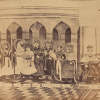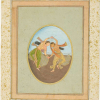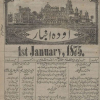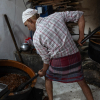Koovagam is a village in the Ulundurpettai taluk located at a distance of 25 Km from Villupuram district, Tamil Nadu. It is famous for its annual festival of transgender and transvestite individuals, which takes place for eighteen days in the Tamil month of Chitirai (April/May) at Koothandeswarar temple, the temple of Lord Aravan.
History
Aravan, son of Pandava prince Arjuna, is a minor character from the Mahabharata. He is also a patron god of well-known transgender communities called Thirunangai (also Aravani in South India, and Hijra throughout South Asia). The Mahabharata portrays Aravan as a legendary hero who sacrifices his life in the 18-day Kurukshetra War (Mahabharata war). However, the South Indian cults have a supplementary tradition of honouring Aravan's self-sacrifice to the goddess Kali for the victory of the Pandavas in the war. The Koothandavar festival focuses on one of the three boons granted to Aravan by the god Krishna in honour of his self-sacrifice. Aravan wanted to get married before his death. Krishna granted Aravan's boon by taking a female form, Mohini. The next day, Aravan sacrificed his life and Mohini grieved like a widow.
Koovagam festival
Transgenders and cross-dressers from all over India and neighbouring countries visit Koovagam for this festival. The transgender and male villagers (who have taken vows to Aravan) marry the Lord Koothandavar, thus reenacting the ancient myth. The next day, they mourn the god Koothandavar's death through ritualistic dances, Oppari and by breaking their bangles and cutting the thalis (marriage necklace).
The wedding
In 2012, the wedding happened on May 1st. As per the custom thousands of transgenders dress up as brides of Aravan, and walk to the temple to get a thali tied. Transgenders dance and sing songs around small bonfires, celebrating their wedding and making their 'spouse' happy. For them, the festival is about love, pain and sacrifice. After tying the thali in the temple, the 'first night' is celebrated with great pomp. The entire village is awake and scores of outsiders come to the temple to offer prayers.
The day of sacrifice
As the chariot with the idol of Aravan begins its procession around the village, those who have tied the thali begin to cut it. They then break their bangles, put on white sarees to depict widowhood, and sing songs to mourn his death.
Music Credits: Ilayaraja
Photography & Editing: Premkumar Sachidanandam
Sparkcrews Studios| www.sparkcrews.com -©













